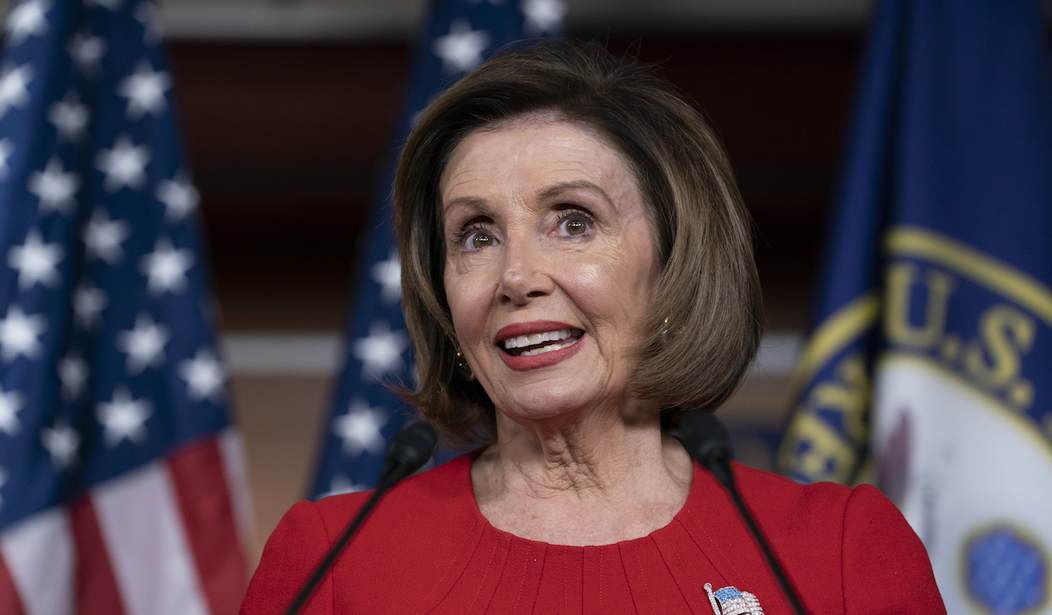Well, she's very likely going into the minority, involuntarily, but that's another story. There have been a number of rumors and pieces about House Democrats wanting fresh leadership after the 2022 election, with jockeying having begun nearly a year ago. Nancy Pelosi, who has ruled her caucus since 2003, sometimes ruthlessly, clung to power in late 2018 by pledging to renegades that she would exit stage left in the coming years.
Here's how the Washington Post reported on it at the time:
Rep. Nancy Pelosi clinched the votes for a second stint as House speaker on Wednesday after agreeing to serve no more than four years in a deal with a group of Democratic rebels — a significant concession to their demands for generational change. The group of insurgents wanted new blood in the top Democratic ranks and maneuvered for months to deny Pelosi (D-Calif.) the votes she would need. After weeks of behind-the-scenes negotiating, Pelosi backed off her resistance to setting a date for her departure but avoided becoming an immediate lame duck. “Over the summer, I made it clear that I see myself as a bridge to the next generation of leaders, a recognition of my continuing responsibility to mentor and advance new members into positions of power and responsibility in the House Democratic Caucus,” Pelosi said in a statement.
Over the summer, Pelosi gave an interview in which she appeared to balk at the idea of stepping down or retiring in the near future:
Asked during a free association game with interviewer and MSNBC host Mika Brezinski how she feels about the word “retirement,” the 81-year-old Pelosi quipped, “What’s that?” Pelosi told Brezinski “people make their own decisions about timing” and “don’t have to comply with somebody else’s view.” Pelosi hinted in November she would honor a pledge she made to moderate House Democrats in 2018 to only serve two terms, though she has not definitively said she will.
Hinting at something is not the same as stating it outright, of course. Was Pelosi in the process of backpedaling on her reported commitment to some of her members? Fast forward to this week, and CNN is reporting that Pelosi plans to stick around in her current role through the midterms, is inclined to run for re-election – and is evidently not ruling out violating her 2018 promise:
Speaker Nancy Pelosi will stay until at least after the midterm elections, extending her nearly 20-year run as the House's top Democrat after she turns 82 and, perhaps, beyond. She is planning to file and run for reelection in her San Francisco district next year -- at least for now -- in keeping with her pattern of deciding about staying in Congress after the elections, when she likely will have won an 18th full term. And sources familiar with Pelosi's thinking say she isn't ruling out the possibility of trying to stay in leadership after 2022, despite her original vow to leave as the top House Democrat.
I still suspect that if Democrats get walloped next November, as is probable at this point, she will struggle to hang on. This passage from the CNN story affirms that view:
Recommended
In a series of interviews with key aides and more than two dozen House Democratic members -- across age, ideology and geography, and including Pelosi supporters and critics alike -- a portrait emerges of a leader who still commands respect, and no small measure of fear, within her caucus. (Many of those members requested anonymity to speak frankly with CNN and did not want to anger Pelosi or be seen feeding a narrative about Democratic infighting.)...Still, the speaker is also losing her grip on House Democrats. Interviews with her colleagues reveal a struggle to keep up with members who are less concerned with loyalty and allegiance and more willing to blow up negotiations for the sake of a boost on social media or TV. She faced repeated rebellions the last few months, they say...Admirers and detractors both confess to a sense of dread about what things will be like after Pelosi leaves. Her grip on House Democrats may be looser than it was, but whoever comes after her won't have anywhere near that control. And with everyone expecting her departure to come soon, many complained to CNN that she hasn't prepared her caucus for the post-Pelosi era...
It sounds like "everyone" is still "expecting" her forthcoming departure, an expectation that will deepen if and when Democrats lose power. But the anxiety over what or who comes next, and the fear of potential chaos, could play into any plot she may be tentatively hatching to remain in power. The line about sources requesting anonymity to avoid being "seen as feeding a narrative about Democratic infighting" while...actively feeding a narrative about Democratic infighting is peak DC material. And even as Pelosi commands respect and fear within her party – and is generally seen as a very effective vote-counter, despite some embarrassing misfires this year – she remains powerful fodder for Republicans, as she is viewed unfavorably by most of the country:
https://t.co/0DJgNcBAFj pic.twitter.com/5nsNTgUqyo
— Guy Benson (@guypbenson) December 13, 2021
A favorability rating in the mid-20s to mid-30s, with an unfavorable rating in the mid-50s to low 60s, is sub-optimal for one of the leading faces of the party. Especially when the leading face of the party is deep underwater himself. I'll leave you with a word from the RNC Chairwoman:
If Pelosi won’t retire, the voters will just have to fire her.
— Ronna McDaniel (@GOPChairwoman) December 13, 2021

























